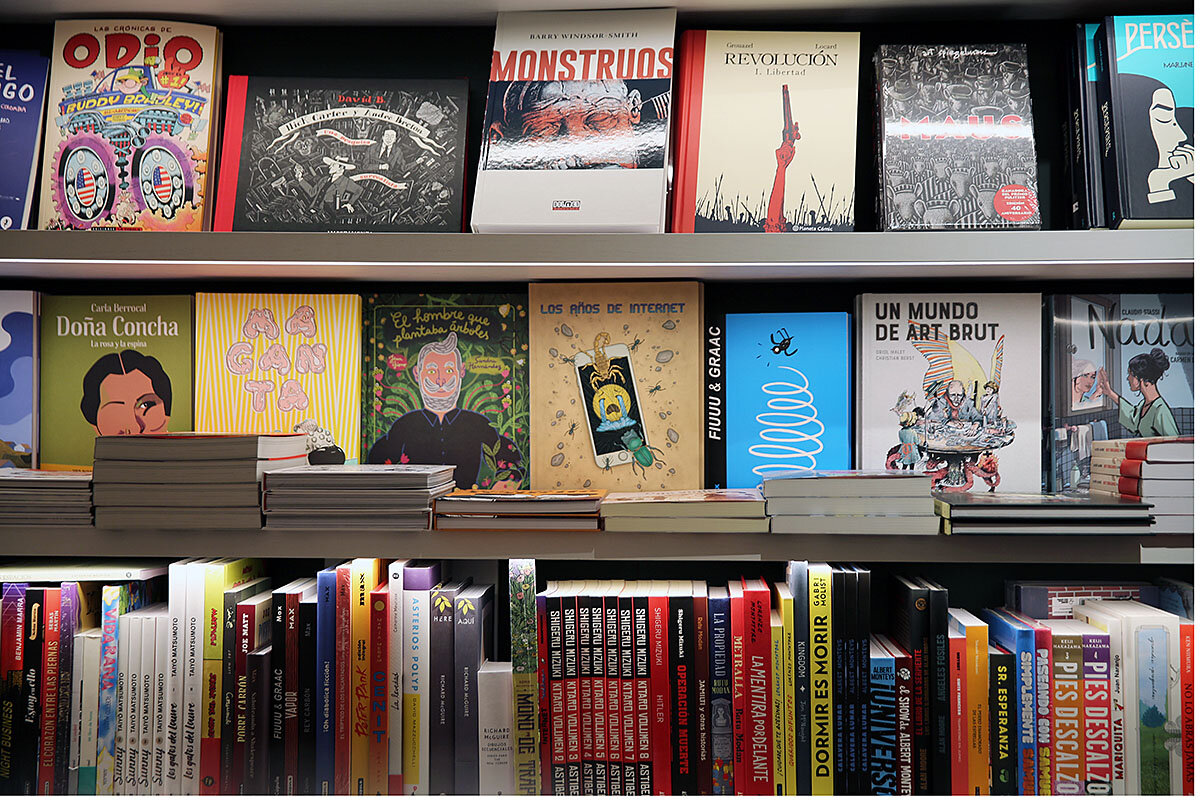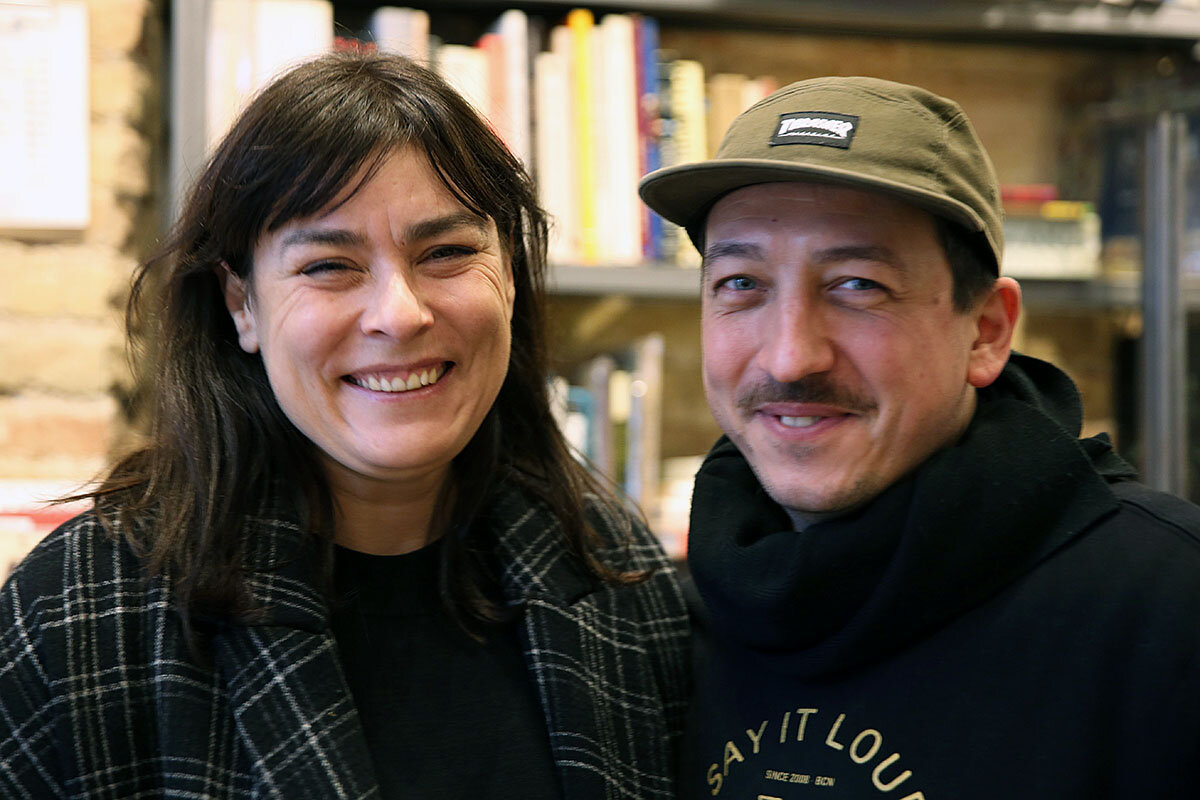Pandemic spurs comeback for indie booksellers – and reading – in Spain
Loading...
| Barcelona, Spain
Opening a bookstore in the middle of a pandemic is not for the faint of heart. But Lucía Boned, co-owner of Terranova, a specialist art bookshop, was convinced she had found the right space: an early 1900s shoe store in a pedestrianized street in Sant Antoni, a neighborhood in Barcelona with a famous outdoor book market.
“There was a lot of uncertainty and nerves, but I followed my intuition,” says Ms. Boned, who opened Terranova in October with her partner, Luis Cerveró.
Books are placed face forward in a burst of bright colors, giving the store the feel of an art gallery or museum gift shop. It’s a strategic choice rooted in practicality as much as aesthetics, since the well-worn shelves are already sagging under the weight.
Why We Wrote This
A flurry of new independent bookstores in Spain has delighted pandemic-weary readers fed up with their screens, and enriched local neighborhoods.
Independent bookstores are making a comeback in Spain, particularly in big cities. In Barcelona and the broader Catalonia region, 15 bookstores opened in 2020 and another handful – including Terranova – in 2021. For a country that endured Europe’s longest lockdown and one of its highest COVID-19 death tolls, it’s a point of light for readers and writers. Tired from working online and watching bad news on their TVs, many Spaniards found comfort and escape in physical books, and emerged from lockdowns with a renewed appreciation for the cultural and social cachet that bookstores bring to a neighborhood.
“It is a very positive development,” says Álvaro Manso, spokesperson for Spain’s Confederation of Booksellers’ Guilds and Associations, which represents around 1,100 stores. He says sales in 2021 were higher than before the pandemic, with a forecast of 20% growth when full-year sales are calculated. “Normally the book sector doesn’t see double-digit growth.”
While the 2020 lockdowns in Spain boosted demand for online retail and services, as they did in many countries, they also led residents to appreciate what they had before, including local bookstores, says Mr. Manso. “Seeing the city without business in the first days after the lockdown reinforced the view that there is a need for neighborhood businesses that breathe life into the city,” he says.
The lockdown also changed reading habits: Individuals spent an average of 8 1/4 hours a week reading during the lockdown period, a full hour more than in 2019, according to the 2020 Barometer of Reading and Book Buying Habits.
This upward trend held true for young readers, too. “We’ve gained new readers, especially children – as well as people in the 30-to-40 age bracket, who were not reading before due to [child] care responsibilities and who have now resumed reading. Parents want their boys and girls to read and have forged this habit for their kids in these difficult times,” says Carmen Ferrer, president of The Guild of Booksellers of Catalonia.
A book in hand
Maria Lopez, who was out hunting for books in Sant Antoni market last month, says she used to read three books at a time before she became a parent; she’s now down to one. “Reading is something I try to transmit to my daughter because since I was a child I have always had a book in hand,” she says.
She appreciates the new choices for bookworms in Barcelona. “It’s great to have a range of small bookstores to choose from,” she says, noting that larger stores often don’t know the authors or titles and can’t advise as well as independents.
A short walk from Terranova is a secondhand bookstore, Restory, where Ms. Lopez likes to browse. Co-owner Pavel Milev opened its doors in October 2020 and has more than 14,000 titles for sale, starting at three euros ($3.40). He says that young readers have surprised him with their passion for books. “It has given us hope and energy to see how many young people come in here and then return seeking advice, wanting to open horizons through reading. It is very, very gratifying. But the truth is people from all generations and social classes show up here.”
Among his clients on a recent Sunday was a tattoo artist looking for inspiration in comic books. Another was Lucas González, who browsed for nearly an hour before buying a detective novel. Born in the Canary Islands, he now lives in Cologne, Germany, where most retailers close on the Christian sabbath. “I’ve never seen a bookstore open on Sundays,” he says.
Digital competition
Like Terranova and Restory, the majority of new bookstores here are passion projects of individuals with a narrow focus; most were conceived pre-pandemic. But Barcelona also has chain stores that occupy thousands of square feet.
“I love literature so much that a good bookshop for me is like a treasure,” says Elena Aguilar, who is making her first visit to Finestres, a large store with an outdoor cafe and cozy couches inside. She averages 10 books per month that she buys or borrows, in addition to gifts from families or friends. “It is a very pleasant surprise to see so many new bookshops open.”
Like other bookworms, she expresses admiration for entrepreneurs taking a bet on old-fashioned media in an era with so many online choices, from books to movies to music.
“It is very brave to open such a business in a digital era,” says Yolanda Casado, another Finestres browser. “It’s risky.”
But Mr. Manso is optimistic. He points out that many bricks-and-mortar stores transitioned online during the pandemic; around 800 are on a platform that allows consumers see whether a book is available in a store in their area.
“This has been a success,” he says. “People use the page to geolocate a book and then go fetch it from a local neighborhood bookshop or buy it online. It is a way for independent bookshops to have a presence online.”
Offline, however, is where bookworms thrive. Several who lingered in the new shops in Barcelona pointed to the pleasure of touching and smelling paper. “I don’t want to read on a screen,” insists Ms. Casado. A client at Terranova noted that while he might occasionally buy books online he’d rather see them and feel them in a physical store.
Many of those behind Barcelona’s new generation of independent stores stress the importance of fostering a sense of community.
“The challenge is ensuring that providing interesting content in terms of books and becoming a cultural hub does not separate you from the neighborhood,” says Mariana Sarrias, who runs a bookstore that organizes literacy events. “You must be part of the neighborhood.”








